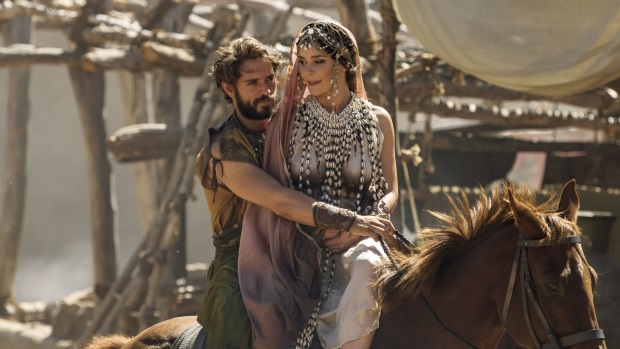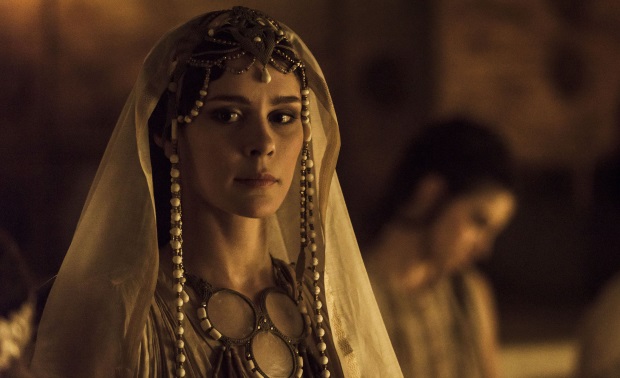Troy: Fall Of A City – flipping the script on The Iliad
Writer of The Night Manager David Farr tells us about new drama Troy: Fall Of A City, starting this Saturday on BBC One...
It has to be noted that the Trojan War, though ripe for retellings, is a story that the majority of an audience will believe they already know. David Farr, writer of BBC One’s new Saturday night epic, would be one of the first to admit it. What makes Troy: Fall Of A City different, however, comes down to perspective. Whereas most tellings focus on the Greeks, Farr wanted to look at what the war must have been like for the Trojans.
Beginning with Paris’ discovery of his true heritage and love story with Helen of Troy, The Night Manager writer wanted to create something from Greek mythology that focused on character over spectacle.
Farr said: “When Derek [Wax, executive producer] approached me with the idea, it was the fact that the Trojan side of the story hadn’t been explored as much as the Greek side. I thought it’d be interesting to reverse that and spend much more time – as television can do very well – inside the walls and exploring the journey of those characters.
“I genuinely thought, how exciting – what’s it like to be under siege? What does it cost the characters inside, particularly the lovers Paris and Helen who have caused this chaos and are both stuck in this city? He’s an outsider because he didn’t realise he was part of the family until much later in life, and she’s from Sparta.”
The series will kick-off a timeslot now reserved for the BBC’s biggest dramas, born of a BBC/Netflix co-production that will result in episodes airing on the streaming service internationally.
“Derek was very clear from the beginning to be ambitious,” Farr continued. “We both share a love of psychological narrative told over [multiple] hours, which film just can’t do. Film tends towards spectacle in these kinds of stories because the budget’s so huge, and I think there’s an audience fatigue for that now.
“With eight hours and good actors we could essentially focus on character, but the Netflix/BBC co-production allows us still to deliver some big visceral thrills along the way.”
At some points the budgetary restrictions were a blessing for creativity, Farr and Wax said, placing the human drama before the action going on around them.

Wax said: “We knew there are different ways in which these stories have been dramatised – there’s the Sunday tea-time Jason And The Argonauts version, and there’s the 300 version. There are all these different ways of approaching it. We wanted to say be as vivid and real as possible, and make it compelling while mining the complexities of the characters as much as possible.”
“If there’s one overarching theme of the piece it’s identity,” Farr added. “You have Helen and Paris, neither of whom quite know who they are, and the simple question the series asks is whether they can ever belong? There are all sort of other characters struggling with the same thing.”
Unlike many tellings, Troy: Fall Of A City is firmly focused on the central couple of Paris and Helen, who have been developed to encompass many interpretations of the characters.
On her understanding of Helen, actress Bella Dayne said: “The more and more I read about her, from sources and people who really studied her for years and dedicated their life to it, I realised that her story had almost always been told by men – she was the ‘unfaithful woman’.
“But reading about how she grew up, her psychology and how she’d been treated – how women were treated – just producing a child and then having no role in society anymore. Thinking about what that would make you as a person, it made me truly understand why she would do what she does.”
Paris, the less culturally notorious of the pair, begins the show as a simple farm boy before he is thrown into the tangled world of royal life.
“Paris lives a very basic life and, once he learns about his familial ties with the royal family, even though it’s a great discovery for him, he does feel imprisoned in this new way of living and these new customs that he has to take on,” said Louis Hunter. “He sees that same thing in Helen.

“You’ll still see a child in Paris as he doesn’t understand those responsibilities, but as the war goes and he sees the death and chaos around him, he does grow up and become a man. He sets out to protect not only his love but also his city and his people.”
The Netflix co-production will provide viewings with two different ways of viewing the series – week-to-week on BBC One or binged on Netflix – but Farr was adamant that he would write the series as episodes, rather than an ‘8-hour movie’.
He said: “I learned this from The Night Manager, that it’s really helpful to write episodically. Dickens famously wrote books in chapters, and what that gives you is the moment where the page turns for viewers and for storytellers.
“In most conventional TV terms it’s called a cliffhanger, but it doesn’t have to be that. It’s just the nature of the story taking a beat. Sometimes we do something bold, like maybe a year or two years will pass, and the pleasure and unexpectedness of that is enjoyable.”
“This is a story that has so much that’s compelling and gripping and has psychological insights about human relationships in times of crisis,” added Derek Wax. “Hopefully it will speak to people whatever platform they watch it on.”
Troy: Fall Of A City starts on Saturday the 17th of February at 9.10pm on BBC One. Read our spoiler-free episode one review here.